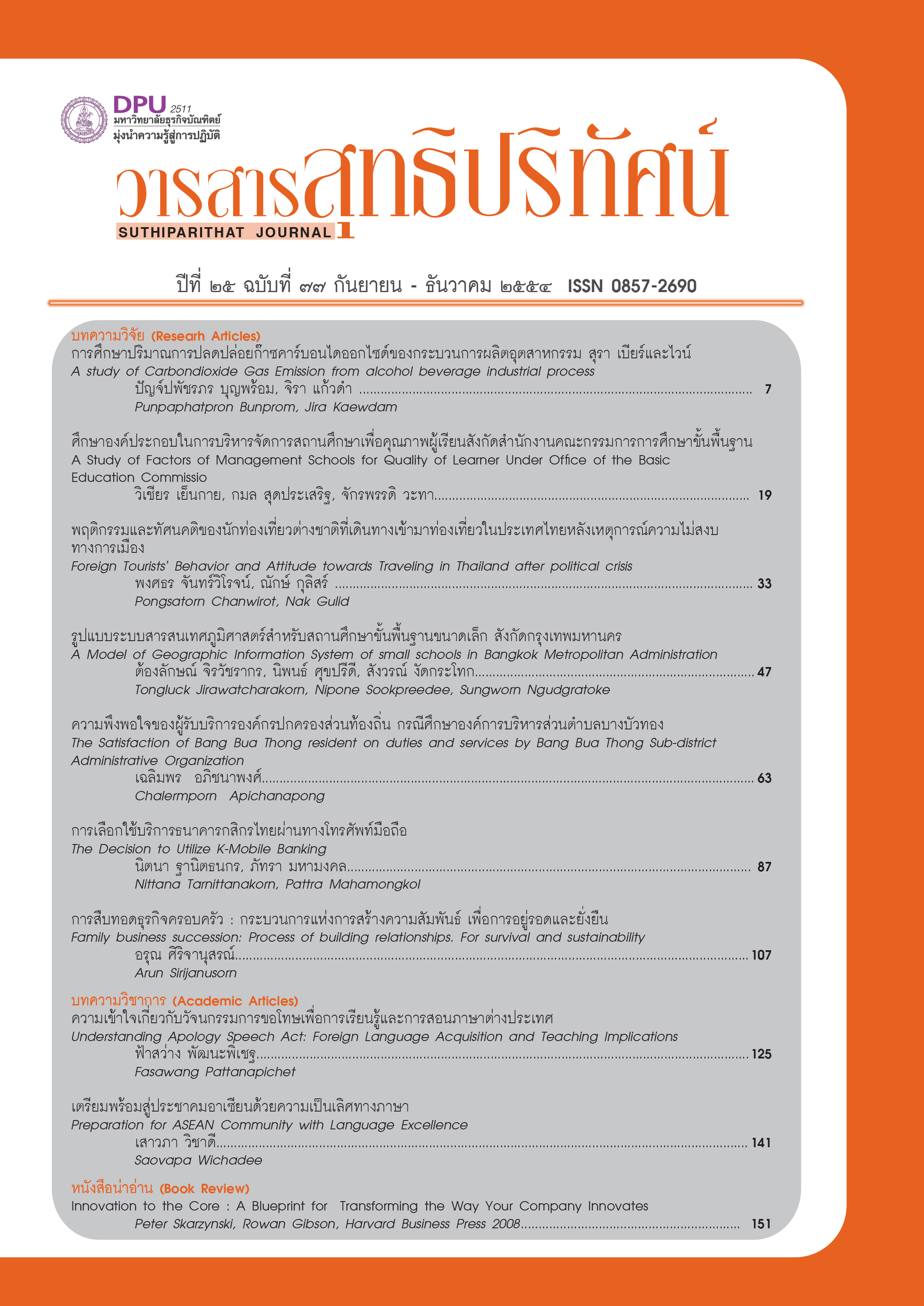ความเข้าใจเกี่ยวกับวัจนกรรมการขอโทษเพื่อการเรียนรู้และการสอนภาษาต่างประเทศ
คำสำคัญ:
วัจนกรรมการขอโทษ, การเรียนภาษาที่สอง, การสอนภาษาต่างประเทศบทคัดย่อ
วัจนกรรม(speech act) การขอโทษเป็นหนึ่งในปัญหาที่พบในหมู่ผู้เรียนภาษา บทความนี้นำเสนอรายละเอียดเชิงทฤษฎีเกี่ยวกับวัจนกรรม (speech act) การขอโทษ งานวิจัยที่เกี่ยวข้องกับการเรียนภาษาที่สองและอภิปรายแนวทางการสอนโดยมีจุดประสงค์เพื่อให้เกิดความตระหนักรู้และความเข้าใจเกี่ยวกับการสอนการขอโทษให้แก่ผู้เรียนภาษาต่างประเทศ
เอกสารอ้างอิง
Nicholas Tavuchis (1991) Mea Culpa: A Sociology of Apology and Reconciliation. Stanford: Stanford University Press.
Erving Goffman (1971). Relations in Public. New York: Harper Colophon Books
Erving Goffman. (1967). Interaction Ritual. Chicago: Aldine Publishing Company
Janet Holmes (1996). Women, Men and Politeness. Singapore: Longman
Blum-Kulka, Shoshanna and Olshtain, Elite (1984) “A Cross-Cultural Study of Speech Act Realization Patterns (CCSARP)”. Applied Linguistics, 5, 3. pp.196-213.
Ardith J. Meier (1992). A Sociopragmatic Contrastive Study of Repair Work in Austrian German and American English. Unpublished PhD dissertation. Austria: University of Vienna
Elite Olshtain and Andrew Cohen (1983). Apology: A Speech Act Set. In N. Wolfson and E. Judd (Eds.), Sociolinguistics and Language Acquisition (pp.18-35). Rowley, MA: Newbury.
Elite Olshtain (1989). Apologies Across Languages. Cross-Cultural Pragmatics : Requests and Apologies. Norwood: Ablex.
Marisa Cordella (1991) “Spanish speakers apologizing in English: a cross cultural pragmatics study”. Australian Review of Applied Linguistics, 14. pp.115-138.
Linnell, Julian, Porter, Felicia, Stone, Holly & Chen, Wan–Lei (1992) Can you apologize me? An investigation of speech act performance among non-native speakers of English. Working papers in Education Linguistics, 8. pp.33-53.
Angela Creese (1991). Speech act variation in British and American English. WPEL, 7, 2. pp. 37-58.
Mir Montserrat (1992).Do We Apologize The Same?: An Empirical Study on the Act of Apologizing by Spanish Speakers Learning English. Pragmatics & Language Learning, 3.pp.1-19
Duk-Young Kim (2001) A Descriptive Analysis of Korean and English Apologies with Implications for Interlanguage Pragmatics PhD dissertation. Faculty of Education. Florida: University of Florida
Yildiz Turgut (2010) Comparison of Korean ESL learners’ with native speakers’ apologies: implications for teachers. Uluslararasi Avrasys Sosyal Bilimler Dergisi, Cilt:1, Sayi:1 s. pp.1-19.
Mehdi Mardani. And A. Eslami-Rasekh (2010). Investigating Effects of Teaching Apology Speech Act, with a Focus on Intensifying Strategies, on Pragmatic Development of EFL Learners: The Iranian Context. The International Journal of Language Society and Culture, 30, Retrieved July13, 2011 from www.educ.utas.edu/users/tle/JOURNAL/
Siriruck Thijittang (2010) Pragmatics strategies of English of Thai University Students; Apology Speech Acts. PhD thesis. University of Tasmania
Farashaiyan, Atieh and Amirkhiz, Seyed (2011). A Descriptive-Comparative Analysis of Apology Strategies: The case of Iranian EFL and Malaysian ESL University Students. English Language Teaching, 4, 1. pp.224-229.
Kasper, Gabriele and Rose, Kenneth R (2001). Pragmatic and Language Teaching. Cambridge: Cambridge University Press pp. 13-32.
Rod Ellis (2003). The Study of Second Language Acquisition. Oxford: Oxford Press pp. 43-62.
Cohen, Andrew D. and Olshtain, Elite (1993). The Production of Speech Acts by EFL Learners. TESOL Quarterly, 27. pp.33-56.
Sachiko Kondo (1997). Longitudinal study on the development of pragmatic competence in a natural learning context–Perception behind performance. Proceedings of Sophia University Linguistic Society, 12. pp.35–54.
Richard Schmidt (1993). Consciousness, Learning and Interlanguage Pragmatics. In S. Blum-Kulka and G. Kasper (eds.) (1993) Interlanguage pragmatics. New York: Oxford University Press.
Elite Olshtain and Andrew Cohen (1991). Teaching Speech Acts Behavior to Nonnative Speakers. In M. Marianne Celce-Murcia (Ed.) Teaching English as a Second or Foreign Language (2nd) (pp.154-165). Boston: Heinle & Heinle
Andrew Cohen (1996). Developing Ability to Perform Speech-acts. Studies in Second Language Acquisition, 18. pp. 253-267.
Ardith J. Meier (1997). Teaching the universals of politeness. ELT Journal, 51, 1. pp.21-28
Alicia Martinez-Flor (2005). A Theoretical Review of the Speech Act of Suggesting towards Taxonomy for its Use in FLT. Revista Alicantina de Estudios Ingleses, 18. pp.167-187
Yoshimi Tateyama (2001) Explicit and Implicit Teaching of Pragmatic Routines. In K.R. Rose and G. Kasper (eds.), Pragmatics in Language Teaching. UK: Cambridge University Press.
Susan Baleghizadeh (2007)”Speech Acts in English Language Teaching”. Iranian Journal of Language Studies, 1-2.pp.143-154.
Richard S. Pinner (2008). Speech Act Theory: Benefits and Insights in English Language Teaching. Master’s thesis. Department of Applied Linguistics and ELT. London: King’s College
ดาวน์โหลด
เผยแพร่แล้ว
รูปแบบการอ้างอิง
ฉบับ
ประเภทบทความ
สัญญาอนุญาต
เนื้อหาและข้อมูลในบทความที่ลงตีพิมพ์ในวารสารสุทธิปริทัศน์ ถือเป็นข้อคิดเห็นและความรับผิดชอบของผู้เขียนบทความโดยตรงซึ่งกองบรรณาธิการวารสาร ไม่จำเป็นต้องเห็นด้วย หรือร่วมรับผิดชอบใด ๆ
บทความ ข้อมูล เนื้อหา รูปภาพ ฯลฯ ที่ได้รับการตีพิมพ์ในวารสารสุทธิปริทัศน์ ถือเป็นลิขสิทธิ์ของวารสารสุทธิปริทัศน์หากบุคคลหรือหน่วยงานใดต้องการนำทั้งหมดหรือส่วนหนึ่งส่วนใดไปเผยแพร่ต่อหรือเพื่อกระทำการใด ๆ จะต้องได้รับอนุญาตเป็นลายลักษณ์อักษรจากวารสารสุทธิปริทัศน์ก่อนเท่านั้น







